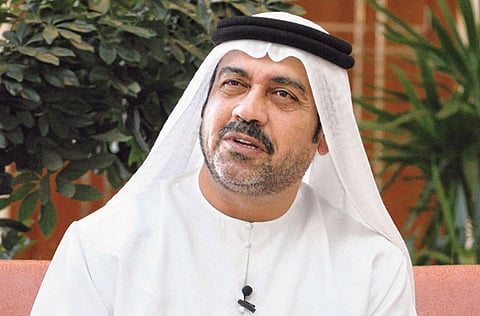Chronicling the history of the UAE
It began when Shaikh Zayed asked his advisers to fetch agreements signed with different countries, Al Rais says

Abu Dhabi: When Shaikh Zayed Bin Sultan Al Nahyan became the Ruler of the Emirate of Abu Dhabi in 1966, there were no dedicated centres to help preserve and document his country's history.
"It all began when late Shaikh Zayed Bin Sultan Al Nahyan asked his advisers for the bilateral agreements that had been signed, specifically those with the British government… his advisers were shocked because at that time, no one was talking about archiving documents… one of his advisers, Ahmad Khalaf Al Suwaidi, informed him that all the documents he was searching for were located at the British archives so a team was dispatched," said Dr Abdullah Al Rais, the director-general of the National Centre for Documentation and Research (NCDR).
The delegates returned with the documents requested, as well as those containing many details about Emirati life, politics and our economic development, which were meticulously documented by British political agents since their arrival to Abu Dhabi in 1667.
‘Conserve and document'
"Shaikh Zayed was concerned about preserving our history so in 1968, he issued a decree establishing the NCDR, which is a division of the Ministry of Presidential Affairs. Its mission is to conserve and document the history of the UAE, which was known as the Trucial States before the unification, from different national archives around the world," Dr Al Rais said.
He noted that since then, delegates had been dispatched to many countries that have a documented history with the UAE, including the UK, Portugal, the Netherlands and India, specifically Bombay (now called Mumbai).
"The oldest documents we have were collected from Portugal's archives. They date back to 1507 when they had a maritime presence in Kalba and Khorfakkan (both located on the Eastern coast) as well as Ras Al Khaimah...the next oldest are those collected from the Dutch archives that describe their experiences in 1623 and 1667 when they navigated the various islands located off Abu Dhabi's coast. And of course, we collected documents from the British archives from 1667 until the formation of the UAE federation in 1971," Al Rais said.
While the director-general notes that every document located within the centre is important in its own right, he revealed that there were two that were most dear to him.
"The first is, of course, the agreement signed to establish the UAE federation. The second is the decree No. 4 of 1967. It stated that Abu Dhabi would not provide any oil to Western countries and was issued after Shaikh Zayed attended the Oil Minister's Conference, where it was unanimously agreed that all oil in the region would not be exported to the West [in response to the start of the Six-Day War]. Three months later, during a review to see who had maintained the embargo, it turned out that Shaikh Zayed was the only one to do so… what's amazing was that this was issued when he was the ruler of the Emirate of Abu Dhabi… also many people thought that it was issued in 1973, after the unification [of the UAE]," Al Rais said
Massive upgrade
As part of its mission to continuously strengthen its capabilities, the centre underwent a massive upgrade beginning from the year 2000, expanding its premises, acquiring the latest tools and enhancing its staff's expertise.
"As a result of all our efforts, our archives are now considered among the top five in the world… we have also become a part of the International Council on Archives (ICA) and even hosted them in the centre… we have also signed MOUs with the Canadian, British, US and Australian archives… this allows us to not only benefit from our partnership with them but also can discuss the latest methods and techniques among fellow members within the ICA," Al Rais said.
But while he acknowledges that the centre enjoys the full cooperate and support of the government and vital institutions, the director-general said that the centre is still facing several challenges.
Achievements
"We are currently understaffed…we need 4,000 archivists in order to run everything efficiently and we still also have limited resources despite the support we are being provided," Al Rais said.
"However, I truly believe that we have made it. It's been a long, hard journey that began with Shaikh Zayed but now, we are seeing the fruit of his efforts," he added.
Al Rais also noted that the 40th anniversary of the UAE's unification is an event that he is extremely proud to celebrate, as it highlights all the achievements the country has made in less than a decade.
— With additional inputs from Abdulla Rasheed, Abu Dhabi Bureau Chief



